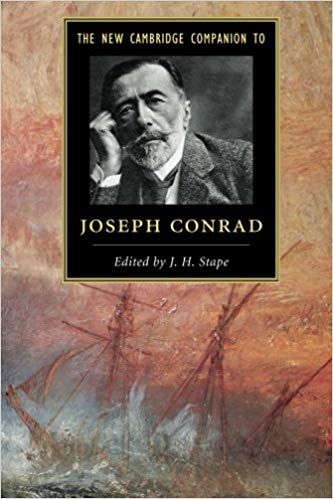tutorial, characters, resources, videos, writing
Heart of Darkness (1902) is a tightly controlled novella which has assumed classic status as an account of the process of Imperialism. It documents the search for a mysterious Kurtz, who has ‘gone too far’ in his exploitation of Africans in the ivory trade. The reader is plunged deeper and deeper into the ‘horrors’ of what happened when Europeans invaded the continent. This might well go down in literary history as Conrad’s finest and most insightful achievement, and it is based on his own experiences as a sea captain.
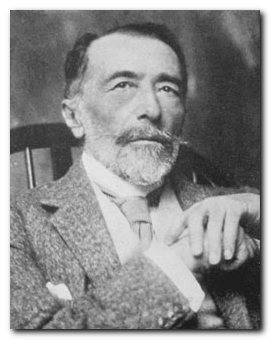
Joseph Conrad
Heart of Darkness – plot summary
The story opens with five men on a boat on the river Thames. Marlow begins telling a story of a job he took as captain of a steamship in Africa. He begins by ruminating on how Britain’s image among Ancient Roman officials must have been similar to Africa’s image among nineteenth century British officials. He describes how his aunt secured the job for him. When he arrives in Africa, he encounters many men he dislikes as they strike him as untrustworthy. They speak of a man named Kurtz, who has a reputation as a rogue ivory collector, but who is “essentially a great musician,” a journalist, a skilled painter and “a universal genius.”
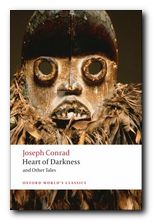 Marlow arrives at the Central Station run by the general manager, an unwholesome conspiratorial character. He finds that his steamship has been sunk and spends several months waiting for parts to repair it. Kurtz is rumored to be ill, making the delays in repairing the ship all the more costly. Marlow eventually gets the parts and he and the manager set out with a few agents and a crew of cannibals on a long, difficult voyage up river. The dense jungle and oppressive silence make everyone aboard a little jumpy and the occasional glimpse of a native village or the sound of drums works the voyagers into a frenzy.
Marlow arrives at the Central Station run by the general manager, an unwholesome conspiratorial character. He finds that his steamship has been sunk and spends several months waiting for parts to repair it. Kurtz is rumored to be ill, making the delays in repairing the ship all the more costly. Marlow eventually gets the parts and he and the manager set out with a few agents and a crew of cannibals on a long, difficult voyage up river. The dense jungle and oppressive silence make everyone aboard a little jumpy and the occasional glimpse of a native village or the sound of drums works the voyagers into a frenzy.
Marlow and his crew come across a hut with stacked firewood together with a note saying that the wood is for them but that they should approach cautiously. Shortly after the steamer has taken on the firewood it is surrounded by a dense fog. When the fog clears, the ship is attacked by an unseen band of natives, who fire arrows from the safety of the forest. A Russian trader who meets them as they come ashore, assures them that everything is fine and informs them that he is the one who left the wood. Kurtz has established himself as a god with the natives and has gone on brutal raids in the surrounding territory in search of ivory.
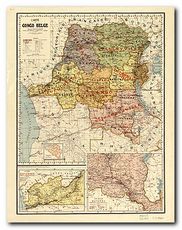 Marlow and his crew take the ailing Kurtz aboard their ship and depart. Kurtz is lodged in Marlow’s pilothouse and Marlow begins to see that Kurtz is every bit as grandiose as previously described. During this time, Kurtz gives Marlow a collection of papers and a photograph for safekeeping. Both had witnessed the Manager going through Kurtz’s belongings. The photograph is of a beautiful woman whom Marlow assumes is Kurtz’s love interest.
Marlow and his crew take the ailing Kurtz aboard their ship and depart. Kurtz is lodged in Marlow’s pilothouse and Marlow begins to see that Kurtz is every bit as grandiose as previously described. During this time, Kurtz gives Marlow a collection of papers and a photograph for safekeeping. Both had witnessed the Manager going through Kurtz’s belongings. The photograph is of a beautiful woman whom Marlow assumes is Kurtz’s love interest.
One night Marlow happens upon Kurtz, obviously near death. As Marlow comes closer with a candle, Kurtz seems to experience a moment of clarity and speaks his last words: “The horror! The horror!” Marlow believes this to be Kurtz’s reflection on the events of his life. Marlow does not inform the Manager or any of the other voyagers of Kurtz’s death; the news is instead broken by the Manager’s child-servant.
Marlow later returns to his home city and is confronted by many people seeking things and ideas of Kurtz. Marlow eventually sees Kurtz’s fiancée about a year later; she is still in mourning. She asks Marlow about Kurtz’s death and Marlow informs her that his last words were her name — rather than, as really happened, “The horror! The horror!”
The story’s conclusion returns to the boat on the Thames and mentions how it seems as though the boat is drifting into the heart of the darkness.
Study resources
![]() Heart of Darkness – Oxford University Press – Amazon UK
Heart of Darkness – Oxford University Press – Amazon UK
![]() Heart of Darkness – Oxford University Press – Amazon US
Heart of Darkness – Oxford University Press – Amazon US
![]() Heart of Darkness – Penguin Classics – Amazon UK
Heart of Darkness – Penguin Classics – Amazon UK
![]() Heart of Darkness – Penguin Classics – Amazon US
Heart of Darkness – Penguin Classics – Amazon US
![]() Heart of Darkness – Wordsworth Classics – Amazon UK
Heart of Darkness – Wordsworth Classics – Amazon UK
![]() Heart of Darkness – Wordsworth Classics – Amazon US
Heart of Darkness – Wordsworth Classics – Amazon US
![]() Heart of Darkness – eBook version at Project Gutenberg – [FREE]
Heart of Darkness – eBook version at Project Gutenberg – [FREE]
![]() Heart of Darkness – York Notes (Advanced) – Amazon UK
Heart of Darkness – York Notes (Advanced) – Amazon UK
![]() Heart of Darkness – audioBook version (unabridged) – Amazon UK
Heart of Darkness – audioBook version (unabridged) – Amazon UK
![]() Joseph Conrad’s Heart of Darkness: A Casebook – Amazon UK
Joseph Conrad’s Heart of Darkness: A Casebook – Amazon UK
![]() Conrad’s ‘Heart of Darkness’ – criticism (Bloomsbury) – Amazon UK
Conrad’s ‘Heart of Darkness’ – criticism (Bloomsbury) – Amazon UK
![]() Joseph Conrad’s ‘Heart of Darkness’ – criticism (Chelsea) – Amazon UK
Joseph Conrad’s ‘Heart of Darkness’ – criticism (Chelsea) – Amazon UK
![]() Joseph Conrad: ‘Heart of Darkness’ – criticism (Icon) – Amazon UK
Joseph Conrad: ‘Heart of Darkness’ – criticism (Icon) – Amazon UK
![]() Joseph Conrad’s ‘Heart of Darkness’ – criticism (Routledge) – Amz UK
Joseph Conrad’s ‘Heart of Darkness’ – criticism (Routledge) – Amz UK
![]() Conrad’s ‘Heart of Darkness’ – criticism (Penguin) – Amazon UK
Conrad’s ‘Heart of Darkness’ – criticism (Penguin) – Amazon UK
![]() An Image of Africa: Racism in Conrad’s ‘Heart of Darkness’
An Image of Africa: Racism in Conrad’s ‘Heart of Darkness’
![]() Heart of Darkness – audioBook at LibriVox
Heart of Darkness – audioBook at LibriVox
![]() The Cambridge Companion to Joseph Conrad – Amazon UK
The Cambridge Companion to Joseph Conrad – Amazon UK
![]() Routledge Guide to Joseph Conrad – Amazon UK
Routledge Guide to Joseph Conrad – Amazon UK
![]() Oxford Reader’s Companion to Conrad – Amazon UK
Oxford Reader’s Companion to Conrad – Amazon UK
![]() Joseph Conrad at Wikipedia – biographical notes, links
Joseph Conrad at Wikipedia – biographical notes, links
![]() Joseph Conrad at Mantex – tutorials, web links, study resources
Joseph Conrad at Mantex – tutorials, web links, study resources
Heart of Darkness – film adaptation
Francis Ford Coppola’s adaptation of Heart of Darkness transforms events from Europe’s imperialist exploitation of the the Belgian Congo to America’s war in Vietnam in the 1960s. It remains amazingly faithful to the original, even whilst translating the settings and events into the fully mechanised assault of the world’s most powerful industrial nation against a country of poor farmers and peasants. Marlow becomes Captain Willard, who is sent on a mission to terminate (‘with extreme prejudice’) the command of rogue Major Kurtz, who has gone over the border into Cambodia with a band of followers.
Francis Ford Coppola adaptation 1979
![]() See reviews of the film at the Internet Movie Database
See reviews of the film at the Internet Movie Database
Principal characters
| I | an unnamed outer narrator who relays Marlow’s story |
| Marlow | a ferry-boat captain, the principal character and narrator of events |
| Kurtz | chief of the Inner Station of Belgian ivory traders |
| General manager | chief of the Outer Station |
| Chief accountant | impeccably dressed functionary |
| Pilgrims | greedy agents of the Outer Station |
| Cannibals | natives hired as steamer crew |
| Russian trader | a disciple of Kurtz with patched clothes |
| Helmsman | native sailor who is killed in the attack on the boat |
| Kurtz’s African mistress | powerful and mysterious woman who never speaks |
| Kurtz’s ‘intended’ | his devoted fiancee in Bussels |
| Aunt | relative who secures Marlow his job |
Biography
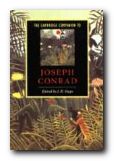 The Cambridge Companion to Joseph Conrad offers a series of essays by leading Conrad scholars aimed at both students and the general reader. There’s a chronology and overview of Conrad’s life, then chapters that explore significant issues in his major writings, and deal in depth with individual works. These are followed by discussions of the special nature of Conrad’s narrative techniques, his complex relationships with late-Victorian imperialism and with literary Modernism, and his influence on other writers and artists. Each essay provides guidance to further reading, and a concluding chapter surveys the body of Conrad criticism.
The Cambridge Companion to Joseph Conrad offers a series of essays by leading Conrad scholars aimed at both students and the general reader. There’s a chronology and overview of Conrad’s life, then chapters that explore significant issues in his major writings, and deal in depth with individual works. These are followed by discussions of the special nature of Conrad’s narrative techniques, his complex relationships with late-Victorian imperialism and with literary Modernism, and his influence on other writers and artists. Each essay provides guidance to further reading, and a concluding chapter surveys the body of Conrad criticism.
Buy the book at Amazon UK
Buy the book at Amazon US
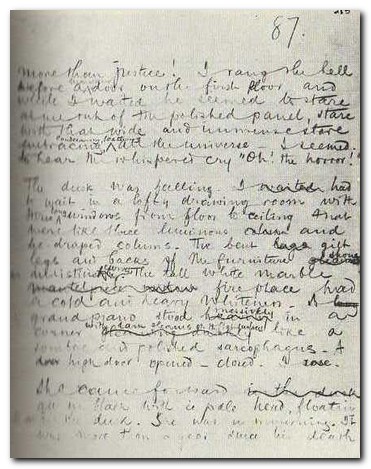
Manuscript page from Heart of Darkness
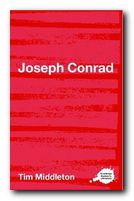 Joseph Conrad’s Heart of Darkness is a good introduction to Conrad and criticism of the text. It includes a potted biography, an outline of the novella, and pointers towards the main critical writings – from the early comments by his contemporaries to critics of the present day. The latter half of the book is given over to five extended critical readings of the text. These represent what are currently perceived as major schools of literary criticism – neo-Marxist, historicism, feminism, deconstructionist, and narratological.
Joseph Conrad’s Heart of Darkness is a good introduction to Conrad and criticism of the text. It includes a potted biography, an outline of the novella, and pointers towards the main critical writings – from the early comments by his contemporaries to critics of the present day. The latter half of the book is given over to five extended critical readings of the text. These represent what are currently perceived as major schools of literary criticism – neo-Marxist, historicism, feminism, deconstructionist, and narratological.
Buy the book at Amazon UK
Buy the book at Amazon US
Further reading
![]() Amar Acheraiou Joseph Conrad and the Reader, London: Macmillan, 2009.
Amar Acheraiou Joseph Conrad and the Reader, London: Macmillan, 2009.
![]() Jacques Berthoud, Joseph Conrad: The Major Phase, Cambridge: Cambridge University Press, 1978.
Jacques Berthoud, Joseph Conrad: The Major Phase, Cambridge: Cambridge University Press, 1978.
![]() Muriel Bradbrook, Joseph Conrad: Poland’s English Genius, Cambridge: Cambridge University Press, 1941
Muriel Bradbrook, Joseph Conrad: Poland’s English Genius, Cambridge: Cambridge University Press, 1941
![]() Harold Bloom (ed), Joseph Conrad (Bloom’s Modern Critical Views, New Yoprk: Chelsea House Publishers, 2010
Harold Bloom (ed), Joseph Conrad (Bloom’s Modern Critical Views, New Yoprk: Chelsea House Publishers, 2010
![]() Hillel M. Daleski , Joseph Conrad: The Way of Dispossession, London: Faber, 1977
Hillel M. Daleski , Joseph Conrad: The Way of Dispossession, London: Faber, 1977
![]() Daphna Erdinast-Vulcan, Joseph Conrad and the Modern Temper, Oxford: Oxford University Press, 1991.
Daphna Erdinast-Vulcan, Joseph Conrad and the Modern Temper, Oxford: Oxford University Press, 1991.
![]() Aaron Fogel, Coercion to Speak: Conrad’s Poetics of Dialogue, Cambridge, Mass: Harvard University Press, 1985
Aaron Fogel, Coercion to Speak: Conrad’s Poetics of Dialogue, Cambridge, Mass: Harvard University Press, 1985
![]() John Dozier Gordon, Joseph Conrad: The Making of a Novelist, Cambridge, Mass: Harvard University Press, 1940
John Dozier Gordon, Joseph Conrad: The Making of a Novelist, Cambridge, Mass: Harvard University Press, 1940
![]() Albert J. Guerard, Conrad the Novelist, Cambridge, Mass: Harvard University Press, 1958
Albert J. Guerard, Conrad the Novelist, Cambridge, Mass: Harvard University Press, 1958
![]() Robert Hampson, Joseph Conrad: Betrayal and Identity, Basingstoke: Macmillan, 1992
Robert Hampson, Joseph Conrad: Betrayal and Identity, Basingstoke: Macmillan, 1992
![]() Jeremy Hawthorn, Joseph Conrad: Language and Fictional Self-Consciousness, London: Edward Arnold, 1979
Jeremy Hawthorn, Joseph Conrad: Language and Fictional Self-Consciousness, London: Edward Arnold, 1979
![]() Jeremy Hawthorn, Joseph Conrad: Narrative Technique and Ideological Commitment, London: Edward Arnold, 1990
Jeremy Hawthorn, Joseph Conrad: Narrative Technique and Ideological Commitment, London: Edward Arnold, 1990
![]() Jeremy Hawthorn, Sexuality and the Erotic in the Fiction of Joseph Conrad, London: Continuum, 2007.
Jeremy Hawthorn, Sexuality and the Erotic in the Fiction of Joseph Conrad, London: Continuum, 2007.
![]() Owen Knowles, The Oxford Reader’s Companion to Conrad, Oxford: Oxford University Press, 1990
Owen Knowles, The Oxford Reader’s Companion to Conrad, Oxford: Oxford University Press, 1990
![]() Jakob Lothe, Joseph Conrad: Voice, Sequence, History, Genre, Ohio State University Press, 2008
Jakob Lothe, Joseph Conrad: Voice, Sequence, History, Genre, Ohio State University Press, 2008
![]() Gustav Morf, The Polish Shades and Ghosts of Joseph Conrad, New York: Astra, 1976
Gustav Morf, The Polish Shades and Ghosts of Joseph Conrad, New York: Astra, 1976
![]() Ross Murfin, Conrad Revisited: Essays for the Eighties, Tuscaloosa, Ala: University of Alabama Press, 1985
Ross Murfin, Conrad Revisited: Essays for the Eighties, Tuscaloosa, Ala: University of Alabama Press, 1985
![]() Jeffery Myers, Joseph Conrad: A Biography, Cooper Square Publishers, 2001.
Jeffery Myers, Joseph Conrad: A Biography, Cooper Square Publishers, 2001.
![]() Zdzislaw Najder, Joseph Conrad: A Life, Camden House, 2007.
Zdzislaw Najder, Joseph Conrad: A Life, Camden House, 2007.
![]() George A. Panichas, Joseph Conrad: His Moral Vision, Mercer University Press, 2005.
George A. Panichas, Joseph Conrad: His Moral Vision, Mercer University Press, 2005.
![]() John G. Peters, The Cambridge Introduction to Joseph Conrad, Cambridge: Cambridge University Press, 2006.
John G. Peters, The Cambridge Introduction to Joseph Conrad, Cambridge: Cambridge University Press, 2006.
![]() James Phelan, Joseph Conrad: Voice, Sequence, History, Genre, Ohio State University Press, 2008.
James Phelan, Joseph Conrad: Voice, Sequence, History, Genre, Ohio State University Press, 2008.
![]() Edward Said, Joseph Conrad and the Fiction of Autobiography, Cambridge Mass: Harvard University Press, 1966
Edward Said, Joseph Conrad and the Fiction of Autobiography, Cambridge Mass: Harvard University Press, 1966
![]() Allan H. Simmons, Joseph Conrad: (Critical Issues), London: Macmillan, 2006.
Allan H. Simmons, Joseph Conrad: (Critical Issues), London: Macmillan, 2006.
![]() J.H. Stape, The Cambridge Companion to Joseph Conrad, Cambridge: Cambridge University Press, 1996
J.H. Stape, The Cambridge Companion to Joseph Conrad, Cambridge: Cambridge University Press, 1996
![]() John Stape, The Several Lives of Joseph Conrad, Arrow Books, 2008.
John Stape, The Several Lives of Joseph Conrad, Arrow Books, 2008.
![]() Peter Villiers, Joseph Conrad: Master Mariner, Seafarer Books, 2006.
Peter Villiers, Joseph Conrad: Master Mariner, Seafarer Books, 2006.
![]() Ian Watt, Conrad in the Nineteenth Century, London: Chatto and Windus, 1980
Ian Watt, Conrad in the Nineteenth Century, London: Chatto and Windus, 1980
![]() Cedric Watts, Joseph Conrad: (Writers and their Work), London: Northcote House, 1994.
Cedric Watts, Joseph Conrad: (Writers and their Work), London: Northcote House, 1994.
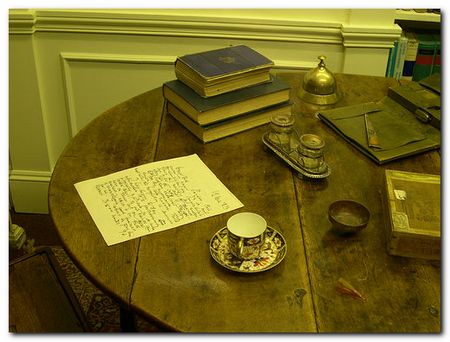
Joseph Conrad’s writing table
Other novels by Joseph Conrad
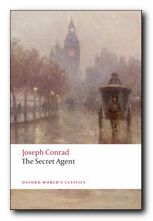 The Secret Agent (1907) is a short novel and a masterpiece of sustained irony. It is based on the real incident of a bomb attack on the Greenwich Observatory in 1888 and features a cast of wonderfully grotesque characters: Verloc the lazy double agent, Inspector Heat of Scotland Yard, and the Professor – an anarchist who wanders through the novel with bombs strapped round his waist and the detonator in his hand. The English government and police are subject to sustained criticism, and the novel bristles with some wonderfully orchestrated effects of dramatic irony – all set in the murky atmosphere of Victorian London. Here Conrad prefigures all the ambiguities which surround two-faced international relations, duplicitous State realpolitik, and terrorist outrage which still beset us more than a hundred years later.
The Secret Agent (1907) is a short novel and a masterpiece of sustained irony. It is based on the real incident of a bomb attack on the Greenwich Observatory in 1888 and features a cast of wonderfully grotesque characters: Verloc the lazy double agent, Inspector Heat of Scotland Yard, and the Professor – an anarchist who wanders through the novel with bombs strapped round his waist and the detonator in his hand. The English government and police are subject to sustained criticism, and the novel bristles with some wonderfully orchestrated effects of dramatic irony – all set in the murky atmosphere of Victorian London. Here Conrad prefigures all the ambiguities which surround two-faced international relations, duplicitous State realpolitik, and terrorist outrage which still beset us more than a hundred years later.
![]() Buy the book from Amazon UK
Buy the book from Amazon UK
![]() Buy the book from Amazon US
Buy the book from Amazon US
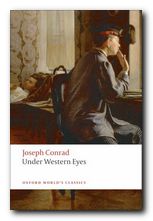 Under Western Eyes (1911) is the story of Razumov, a reluctant ‘revolutionary’. He is in fact a coward who is mistaken for a radical hero and cannot escape from the existential trap into which this puts him. This is Conrad’s searing critique of Russian ‘revolutionaries’ who put his own Polish family into exile and jeopardy. The ‘Western Eyes’ are those of an Englishman who reads and comments on Razumov’s journal – thereby creating another chance for Conrad to recount the events from a very complex perspective. Razumov achieves partial redemption as a result of his relationship with a good woman, but the ending, with faint echoes of Dostoyevski, is tragic for all concerned.
Under Western Eyes (1911) is the story of Razumov, a reluctant ‘revolutionary’. He is in fact a coward who is mistaken for a radical hero and cannot escape from the existential trap into which this puts him. This is Conrad’s searing critique of Russian ‘revolutionaries’ who put his own Polish family into exile and jeopardy. The ‘Western Eyes’ are those of an Englishman who reads and comments on Razumov’s journal – thereby creating another chance for Conrad to recount the events from a very complex perspective. Razumov achieves partial redemption as a result of his relationship with a good woman, but the ending, with faint echoes of Dostoyevski, is tragic for all concerned.
![]() Buy the book from Amazon UK
Buy the book from Amazon UK
![]() Buy the book from Amazon US
Buy the book from Amazon US
© Roy Johnson 2010
Joseph Conrad links
![]() Joseph Conrad at Mantex
Joseph Conrad at Mantex
Biography, tutorials, book reviews, study guides, videos, web links.
![]() Joseph Conrad – his greatest novels and novellas
Joseph Conrad – his greatest novels and novellas
Brief notes introducing his major works in recommended editions.
![]() Joseph Conrad at Project Gutenberg
Joseph Conrad at Project Gutenberg
A major collection of free eTexts in a variety of formats.
![]() Joseph Conrad at Wikipedia
Joseph Conrad at Wikipedia
Biography, major works, literary career, style, politics, and further reading.
![]() Joseph Conrad at the Internet Movie Database
Joseph Conrad at the Internet Movie Database
Adaptations for the cinema and television – in various languages. Full details of directors and actors, production notes, box office, trivia, and quizzes.
![]() Works by Joseph Conrad
Works by Joseph Conrad
Large online database of free HTML texts, digital scans, and eText versions of novels, stories, and occasional writings.
![]() The Joseph Conrad Society (UK)
The Joseph Conrad Society (UK)
Conradian journal, reviews. and scholarly resources.
![]() The Joseph Conrad Society of America
The Joseph Conrad Society of America
American-based – recent publications, journal, awards, conferences.
![]() Hyper-Concordance of Conrad’s works
Hyper-Concordance of Conrad’s works
Locate a word or phrase – in the context of the novel or story.
More on Joseph Conrad
Twentieth century literature
More on Joseph Conrad tales
